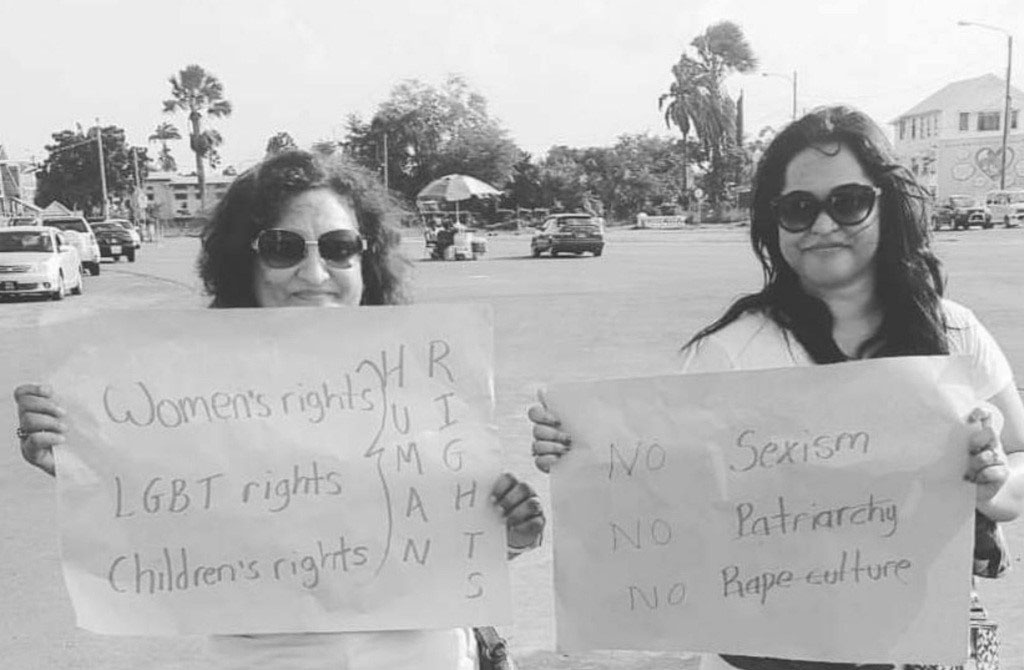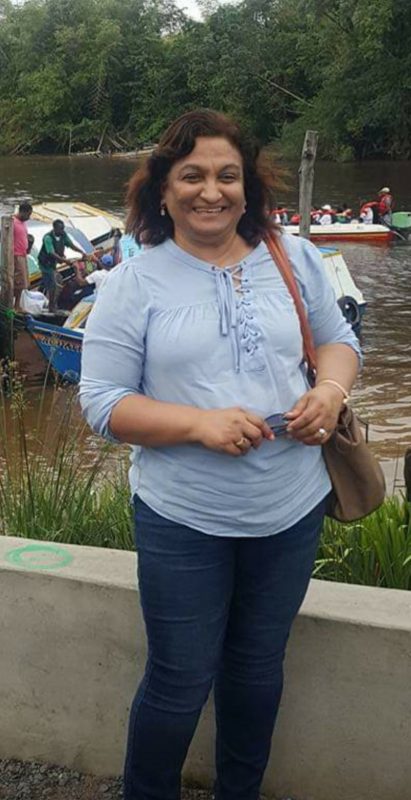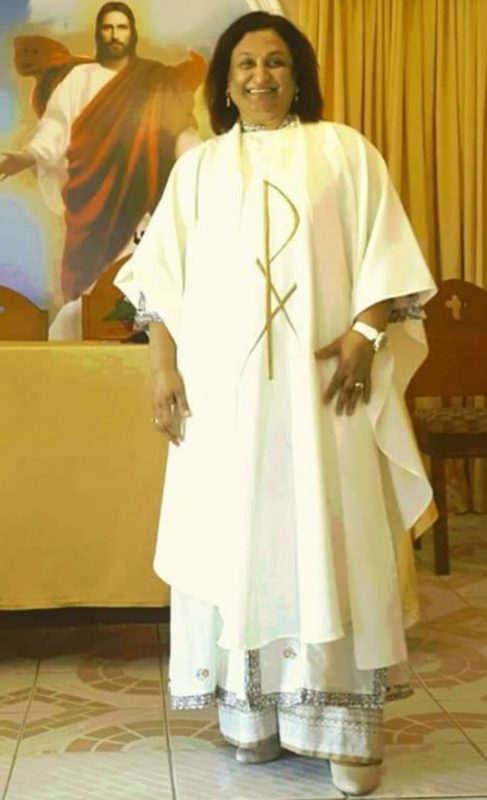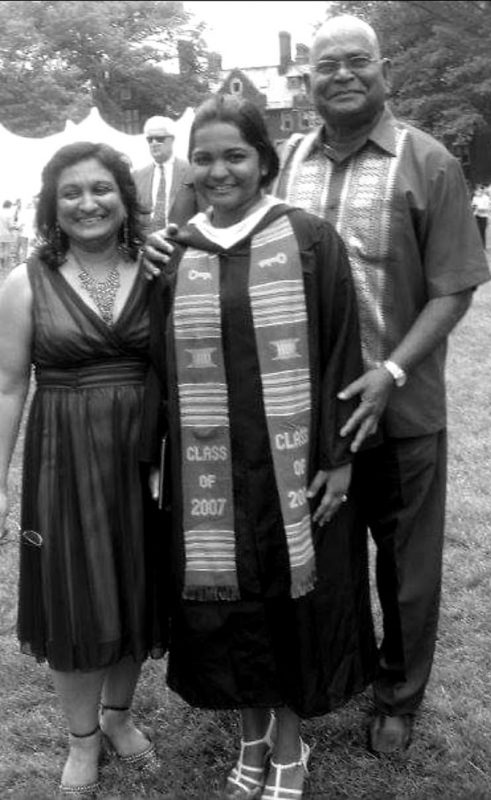Gender and social activist and a justice seeking Christian, Reverend Patricia Sheerattan,-Bisnauth’s belief that God is sovereign in the world, love, justice and compassion has shaped her to be a servant to serve that larger purpose in keeping with her religion which is not prescriptive.
“We still have that colonial big stick about how we prescribe in Christianity. Christianity is still seen as a prescriptive religion when really and truly we don’t read the Bible with the eyes of those who really suffer. For me, without the connectedness of those who are suffering then we cannot really serve,” she told Stabroek Weekend.
As Chief Executive Officer of the Antigua-based Caribbean Family Planning Affiliation Limited (CFPA) since 2018, Sheerattan-Bisnauth, 61, has headed the establishment of a Caribbean observatory on sexual and reproductive health and rights, which looks at the linkages of gender-based violence. It is the first of its kind in the region.
“We in the Caribbean and in Guyana, have some of the highest rates of gender-based violence in the world. The strategies we have had, have not been able to advance where we need to be. The CFPA has been engaging men as an important part of the solution to end gender-based violence,” she said. “If we continue to look at men largely as perpetrators and do it the same way, we will not make a difference. While justice is important and perpetrators must be accountable, what are we going to do? Fill the jails with men who are fathers, sons and brothers? Grenada has a good programme and we have been using the country as an example to reframe the narrative.”
The CFPA provides technical assistance and support to ensure that member countries are equipped and supported to service their societies and to play a role in galvanising regional advocacy for issues of gender equality, sexual rights and reproductive rights.
Prior to her role at the CFPA, Sheerattan-Bisnauth was the executive director of the Guyana Responsible Parenthood Association (GRPA) where her focus was on gender and justice, gender equality and rights in relation to sexual and reproductive rights. She was a part of the movement for the decriminalisation of abortion.
“Many saw the bill for decriminalising abortion as promoting abortion. I saw it as the opposite,” she said. Ahead of the 1995 Beijing Conference on Women, she was part of a preparatory committee that worked with women who used abortion as a contraceptive and put their lives at risk. “In spite of stories of women being raped and enduring unwanted pregnancies, there was little move for women to access safe abortion,” she recalled,
She was surprised that the GRPA did not provide for women to have safe abortions. “We started a comprehensive educational programme on abortion and linked that to family planning, women’s health and well-being with the issue of gender, gender justice and men. We ensured a comprehensive approach with counselling, time to make a decision and work with child services to ensure adoption. There was a reduction of repeat abortions,” she said.
With the help of the International Planned Parenthood Federation, the GRPA obtained a doctor from overseas to train and licence doctors and then push for the first clinic to be set up at Georgetown Public Hospital.
In the past when members of the lesbian, gay, bisexual and transgender community were not welcomed to the clinic, Sheerattan-Bisnauth said, “We had to establish that every person has a right. We had no right to be judging people and their sexual orientation. I was happy that during the period I was there, we were able to push the door open and ensure that at the board and staff levels we had a diversity of people who could understand our mission and our service.”
While at the GRPA, she was the minister for four parishes on the East Coast Demerara. “I was always waiting for what people would say, as I was in the media talking about abortion issues and LGBT rights. I organised sessions with the youths and the elders in the church, particularly in the women’s groups, where women felt free to talk about the issue in Bible studies,” she recalled. “Not everyone agreed, but the fact that we could come together and discuss it was very important. They were able to see things from a love and justice tract of the Bible and to reach out to people. My responsibility was to the woman going through the struggle and what God says about our role and responsibilities and ministry for this woman.”
Sheerattan-Bisnauth is the first Guyanese Presbyterian woman to study theology and be ordained.
The first of six siblings, she was born on the Corentyne Coast and grew up in Ogle. She attended Cummings Lodge primary and secondary schools. At 19 years old, she was granted a scholarship from the Presbyterian Church of Canada to read for a degree in theology at the United Theological College of the West Indies, Jamaica.
Growing up in a Christian home, she was interested in ministry from a young age and was active in the church, in youth groups and sports clubs which helped to ground her.
“The church had no female minister. In Sunday school, I thought about these things and questioned them with my family where we had the opportunity to raise these questions. The sibling who followed me was a boy. Some thought that he was in charge and we had a struggle about that,” she said. “I questioned why and people were very forthright about it. They said he is the male. That was in the 60s and 70s when people did not question the norm but I did. I don’t know where I got that critical mind to read what was happening in society, and not accept things I felt were not right.”
Women worked as deaconesses in the ministry; visiting and caring for people and charity.
Sheerattan-Bisnauth said the three years of study at the regional theological institution in Jamaica, which provided for not just one Christian denomination, was quite an opportunity and a good learning experience.
While there, she was attached to the United Church of Jamaica where she started ministering. When she returned to Guyana in 1983, she lived at the Presbyterian Church’s manse at Vryheid’s Lust, East Coast Demerara. She was ordained to the Ministry of Word and Sacrament on January 26, 1984 and has been ministering since.
Sheerattan-Bisnauth became very involved with women’s organisations at a young age.
“We were living in a heavily politicised environment and I was heavily engaged in what was happening around me. Political organisations were more prominent than religious organisations.
I didn’t see our lives and society as compartmentalised. We are part of society as social and spiritual beings, so I was interested in what was happening around me,” she said.
She therefore began to network with civic organisations. In those days, there were not many. In 1986, she began to work as a coordinator with Red Thread, whose women leaders were politically linked to the Working People’s Alliance and who felt there was a lot of work to be done to uplift poorer women given the socio-economic situation in society.
Through Red Thread, Sheerattan-Bisnauth organised for women from different political organisations to give their historical and contemporary perspectives on what International Women’s Day meant to them, coming from a Guyanese and Caribbean background.
Conscious of gender disparities in Guyana, she pursued gender studies at the University of Lulea, Sweden and a bachelor’s degree in social work at the University of Guyana. She pursued studies
in religion and society at Princeton University because of her interest in the role religion plays in society and vice versa.
“I started my work in women and gender with a consciousness and a calling to break barriers in terms of religion and society,” she said.
She worked with Red Thread during the structural adjustment period in the late 1980s when the organisation focused on economic literacy with women from some of the squatting areas. “It was energising to see the capacity and ability of these women and their wisdom to engage with the macro issues in this country,” she said.
SIMAP, GWLI
Before that, in 1993, she joined the Social Impact Amelioration Project (SIMAP) as the coordinator for the first Amerindian development programme after Red Thread negotiated with the government and others to deal with Amerindian issues.
“SIMAP was established to cushion the effects of the structural adjustment programme for poor Guyanese but in terms of the hinterland areas, the Indigenous peoples were not even seen on the poverty map,” she said. “So with our advocacy [SIMAP was just completing its pilot phase with the Inter-American Development Bank (IDB)], the IDB granted us a small fund to begin because they saw Amerindians as not earning an income and not being in the economic mainstream with the ability to pay back a debt.”
Sheerattan-Bisnauth was asked to do the proposal for the fund and to coordinate its usage. “It became quite a success and it showed the importance of community participation and people’s ownership in their development,” she stated.
She became more involved in the women’s movement and learned from leaders such as the late Andaiye who led her to Red Thread, and others who worked in preparation for the Beijing Conference.
Following the conference, Sheerattan-Bisnauth was tasked with conceptualising and establishing, along with a consultant, the Guyana Women’s Leadership Institute (GWLI) at Cove and John, East Coast Demerara. She was subsequently its first coordinator.
“We had to convert the physical infrastructure to suit the programmes being offered, then build the programmes. It was a very challenging, uplifting and energising process. We engaged women farmers and young women in decision-making, brought them together in a consultative process to construct its programmatic areas,” she said.
The GWLI programme initially started with women in politics at the national and local government levels, their role in leadership and their influence in communities. Programmes to meet the need for income generation, life skills and income generating skills followed.
After getting the GWLI up and running, she worked on contract with Help and Shelter for a while. All this time she also continued her voluntary work with her church and the Guyana Council of Churches.
She was at a regional workshop for the World Communion of Reformed Churches, and learned that the organisation had a vacancy for the position of senior programme executive, justice and partnership. She applied, was successful and worked with the 108-member country organisation from May 2000 to 2011 at its secretariat in Geneva, Switzerland.
“As head of the department of partnership of women and men, I liaised a lot with the office of environmental/economic justice department because of what women and men were facing. I was then given the responsibilities for this area after a major world conference we had in Accra, Ghana,” she said.
Visits to the slave castles/dungeons had a profound impact on Sheerattan-Bisnauth, causing her to look at gender issues with a more profound lens.
She worked with people in all the regions of the world and travelled from the Pacific to the Middle East, Asia, Africa, Europe and North America to understand power construction in the wider sense.
“We had some difficult moments in some regions in relation to our discussion on power and gender. I was surprised in that day and age, in the 1990s, it was mainly all White European male in leadership in the alliance. You cannot talk of gender and not talk about race and ethnicity, class and those kinds of divides and interrogate their power relations,” she noted.
She recalled that her predecessor was Kenyan, and her assistant, a tall white German woman, had been in Switzerland for many decades and was with the organisation for a long time. People often thought the German was the executive and Sheerattan-Bisnauth and the Kenyan were the assistants.
“You have to be proven. I did face racism overtly and sometimes not. Once I was going to rent an apartment and I knew enough French to know that the person, speaking with the officer in charge of doing this for us, was asking if I was Black or White and then making a fuss about it,” she said.
Working in an international organisation, she said, “When you are on that kind of platform people look at you differently, in terms of who brings the intellectual resource to the table. Not until we speak up, we are conscious about how we model our engagement and how we challenge this stereotype.”
Sheerattan-Bisnauth got married in 1993 to Dale Bisnauth (now deceased), former education minister and also a presbyterian reverend. She met him after he returned from Jamaica where he had lived and worked for many years. He was also an advocate for gender and justice and was supportive of the decriminalisation of abortion.
The mother and grandmother of one-year-old twins said she and her husband shared some commonalities, including wanting to break the colonial mentality of what mission is and what church means.






